
Archive
| Book Alert, January - February 2016 |
| 1. India's security interest in her neighborhood / Edited by Shekhar Adhikari - London: Pentagon Press, 2015 |
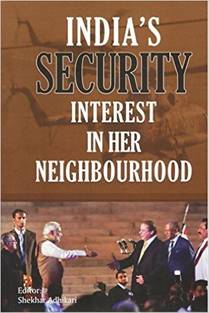 Abstract: India's security interest in her neighborhood has been a major concern. The geostrategic location of India its emergence as a regional power makes it vulnerable to external threats. India has faced wars with neighboring countries like China and Pakistan. The Indian neighbors are full of contradiction, disparities and paradoxes. It has also witnessed liberation movements, nuclear rivalry, military dictatorship and now suffers from insurgencies, religious fundamentalism, terrorism, drugs and human trafficking. The new leadership, under Prime Minister Narendra Modi has ushered a hope in regional matters by emphasizing such issues which are detrimental to India's security. But the pertinent question is where does India stand in this volatile region? India's position is unique in more than one sense. As a matter of fact, India shares borders with all her neighbors whereas no other south Asian nation (except Afghanistan and Pakistan) shares borders with any other South Asian nation. In relative terms, India can be arguably considered as the most stable country in the region, moving ahead on the fast tracks of development, even though the growth has of late is showing variance. Abstract: India's security interest in her neighborhood has been a major concern. The geostrategic location of India its emergence as a regional power makes it vulnerable to external threats. India has faced wars with neighboring countries like China and Pakistan. The Indian neighbors are full of contradiction, disparities and paradoxes. It has also witnessed liberation movements, nuclear rivalry, military dictatorship and now suffers from insurgencies, religious fundamentalism, terrorism, drugs and human trafficking. The new leadership, under Prime Minister Narendra Modi has ushered a hope in regional matters by emphasizing such issues which are detrimental to India's security. But the pertinent question is where does India stand in this volatile region? India's position is unique in more than one sense. As a matter of fact, India shares borders with all her neighbors whereas no other south Asian nation (except Afghanistan and Pakistan) shares borders with any other South Asian nation. In relative terms, India can be arguably considered as the most stable country in the region, moving ahead on the fast tracks of development, even though the growth has of late is showing variance. |
| 2. India's soft power: a new foreign policy strategy / Patryk Kugiel - New Delhi: KW Publishers, 2016 |
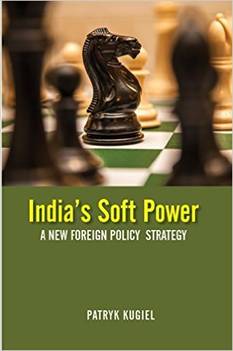 Abstract: It is sometimes said that, in the 21st century, the country that tells the better story wins, rather than the country whose army can prevail on the battlefield. That ability to attract others, persuade and set the agenda, soft power, plays an increasingly important role in international relations and in Indian foreign policy. However, while most of the rediscovered interest in India has been focused on its hard power attributes, such as its military and economy, this book concentrates on less tangible assets, such as its culture, ideas and people. The first comprehensive analysis of India's soft power done from an international relations perspective, this book tracks the changes in Indian foreign policy over last two decades to show how soft power strategy, tools and institutions have been given a more prominent place in India's external affairs. The study evaluates India's soft power assets and liabilities and shows how the state is trying to make better use of this potential to realise its national interests. Abstract: It is sometimes said that, in the 21st century, the country that tells the better story wins, rather than the country whose army can prevail on the battlefield. That ability to attract others, persuade and set the agenda, soft power, plays an increasingly important role in international relations and in Indian foreign policy. However, while most of the rediscovered interest in India has been focused on its hard power attributes, such as its military and economy, this book concentrates on less tangible assets, such as its culture, ideas and people. The first comprehensive analysis of India's soft power done from an international relations perspective, this book tracks the changes in Indian foreign policy over last two decades to show how soft power strategy, tools and institutions have been given a more prominent place in India's external affairs. The study evaluates India's soft power assets and liabilities and shows how the state is trying to make better use of this potential to realise its national interests. |
| 3. Indian foreign policy and the border dispute with China: a new look at Asian relationships / Willem van Eekelen - Boston: Brill Nijhoff , 2016 |
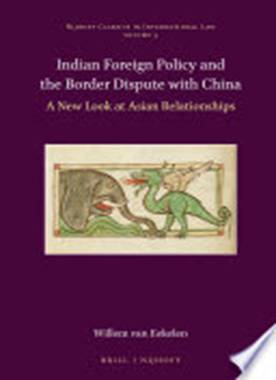 Abstract: This volume is an updated and expanded version of the authors original book, first published by Martinis Nijhoff Publishers and based on his cum laude doctoral dissertation. That volume discussed how the Five Principles of Peaceful Coexistence drowned in the first war between a communist and a non-aligned state. This new edition reproduces the original text, but supplements it considerably in light of subsequent developments and official records and reports only later released or leaked to the public. It places Sino-Indian relations in the wider, current context of the rise of China, the position of Tibet and the disorganized state of Asia. Abstract: This volume is an updated and expanded version of the authors original book, first published by Martinis Nijhoff Publishers and based on his cum laude doctoral dissertation. That volume discussed how the Five Principles of Peaceful Coexistence drowned in the first war between a communist and a non-aligned state. This new edition reproduces the original text, but supplements it considerably in light of subsequent developments and official records and reports only later released or leaked to the public. It places Sino-Indian relations in the wider, current context of the rise of China, the position of Tibet and the disorganized state of Asia. |
| 4. International security studies: theory and practice / Peter Hough, Shahin Malik, Andrew Moran And Bruce Pilbeam - New York: Routledge, 2015 |
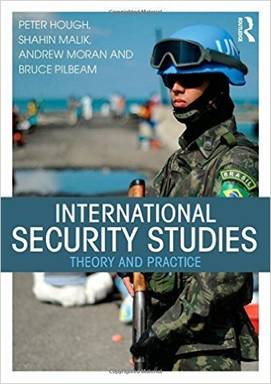 Abstract: addition to presenting the major theoretical perspectives, the book examines a range of important and controversial topics in modern debates, covering both traditional military and non-military security issues, such as proliferation, humanitarian intervention, food security and environmental security. Unlike most standard textbooks, the volume also offers a wide range of case studies – including chapters on the USA, China, the Middle East, Russia, Africa, the Arctic, the Middle East, Europe and Latin America – providing detailed analyses of important global security issues. Abstract: addition to presenting the major theoretical perspectives, the book examines a range of important and controversial topics in modern debates, covering both traditional military and non-military security issues, such as proliferation, humanitarian intervention, food security and environmental security. Unlike most standard textbooks, the volume also offers a wide range of case studies – including chapters on the USA, China, the Middle East, Russia, Africa, the Arctic, the Middle East, Europe and Latin America – providing detailed analyses of important global security issues. |
| 5. Iran's deadly ambition: the Islamic republic's quest for global power / Ilan Berman - New York: Encounter Books, 2015 |
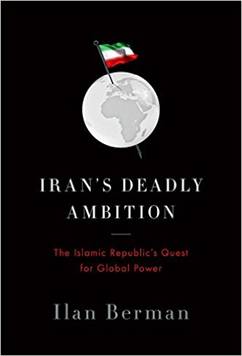 Abstract: Iran's Deadly Ambition explains how America's retraction from the Middle East has created significant breathing room for an Iranian regime that not long ago was on the political ropes. Economically, the Islamic Republic is "out of the box" that was erected over the past decade-and-a-half by Western sanctions, thanks to the "interim" nuclear deal. As a result, Iran's leaders are again thinking big about their country and its place in the world. America faces stark choices: to confront Iran's nuclear ambitions and global activities, or to accept and accommodate the region's newest hegemon, with all that that portends for American security and the safety of its allies. Abstract: Iran's Deadly Ambition explains how America's retraction from the Middle East has created significant breathing room for an Iranian regime that not long ago was on the political ropes. Economically, the Islamic Republic is "out of the box" that was erected over the past decade-and-a-half by Western sanctions, thanks to the "interim" nuclear deal. As a result, Iran's leaders are again thinking big about their country and its place in the world. America faces stark choices: to confront Iran's nuclear ambitions and global activities, or to accept and accommodate the region's newest hegemon, with all that that portends for American security and the safety of its allies. |
| 6. Jammu and Kashmir: politics of identity and separatism / Rekha Chowdhary - London : Routledge , 2016 |
 Abstract: This book provides a comprehensive and up-to-date analysis of the complex conflict situation in Kashmir. Through an internal perspective, it charts the shift in the Kashmiri response towards the Centre and offers a detailed examination of the background in which separatist politics took roots in Kashmir, and the way it changed its nature in the militancy and post-militancy period. The volume shows how separatism and armed militancy, as manifest in the Valley in the late 1980s, (though augmented by external factors) have been internal responses to the changing nature of Kashmiri identity politics. It explores how the ideas central to Indian nationalist politics ? especially democracy and secularism ? echoed in Kashmir and were instrumental in dismantling the feudal structure and negotiating an autonomous space within the framework of asymmetrical federalism. Abstract: This book provides a comprehensive and up-to-date analysis of the complex conflict situation in Kashmir. Through an internal perspective, it charts the shift in the Kashmiri response towards the Centre and offers a detailed examination of the background in which separatist politics took roots in Kashmir, and the way it changed its nature in the militancy and post-militancy period. The volume shows how separatism and armed militancy, as manifest in the Valley in the late 1980s, (though augmented by external factors) have been internal responses to the changing nature of Kashmiri identity politics. It explores how the ideas central to Indian nationalist politics ? especially democracy and secularism ? echoed in Kashmir and were instrumental in dismantling the feudal structure and negotiating an autonomous space within the framework of asymmetrical federalism. |
| 7. JFK’s forgotten crisis: Tibet, the CIA, and Sino-Indian War / Bruce Riedel - Washington: Brooking Institution Press, 2015 |
 Abstract: Bruce Riedel provides new perspective and insights over Kennedy's forgotten crisis in the most dangerous days of the cold war. The Cuban Missile Crisis defined the presidency of John F. Kennedy. But the same week the world stood transfixed by the possibility of nuclear war between the United States and the Soviet Union, Kennedy was also consumed by a war that has escaped history's attention, yet still reverberates significantly today: the Sino-Indian conflict. As well-armed and equipped troops from the People's Republic of China surged into Indian-held territory in October 1962, Kennedy ordered an emergency airlift of supplies to the Indian army. At the same time, he engaged in diplomatic talks that kept the neighboring Pakistanis out of the fighting. Abstract: Bruce Riedel provides new perspective and insights over Kennedy's forgotten crisis in the most dangerous days of the cold war. The Cuban Missile Crisis defined the presidency of John F. Kennedy. But the same week the world stood transfixed by the possibility of nuclear war between the United States and the Soviet Union, Kennedy was also consumed by a war that has escaped history's attention, yet still reverberates significantly today: the Sino-Indian conflict. As well-armed and equipped troops from the People's Republic of China surged into Indian-held territory in October 1962, Kennedy ordered an emergency airlift of supplies to the Indian army. At the same time, he engaged in diplomatic talks that kept the neighboring Pakistanis out of the fighting. |
| 8. The Kurds of Syria: political parties and identity in the Middle East / Harriet Allsopp - London: I.B. Tauris, 2015 |
 Abstract: In September 2014, the Kurdish Syrian city of Kobane was subjected to a massive attack by fighters of the movement Islamic State (IS). As a result, the plight of the Kurds of Syria became known around the world. Less well-known, however, is their struggle before these dramatic and violent events. This struggle was mostly aimed at having their voices heard on the political stage and having equitable access to both economic and political resources. This examination of Kurdish politics in Syria therefore concentrates on the Syrian-Kurdish political parties, which despite state sanctions, have attempted to promote their political agendas and to bring about change for the approximately 3 million Kurds that reside in the country. The Kurds of Syria explores the fundamental issues of minority identity and the concept of being 'stateless' in a turbulent region, making it vital for all those researching the politics of the modern Middle East. Abstract: In September 2014, the Kurdish Syrian city of Kobane was subjected to a massive attack by fighters of the movement Islamic State (IS). As a result, the plight of the Kurds of Syria became known around the world. Less well-known, however, is their struggle before these dramatic and violent events. This struggle was mostly aimed at having their voices heard on the political stage and having equitable access to both economic and political resources. This examination of Kurdish politics in Syria therefore concentrates on the Syrian-Kurdish political parties, which despite state sanctions, have attempted to promote their political agendas and to bring about change for the approximately 3 million Kurds that reside in the country. The Kurds of Syria explores the fundamental issues of minority identity and the concept of being 'stateless' in a turbulent region, making it vital for all those researching the politics of the modern Middle East. |
| 9. The Limits of Partnership: U.S. Russian relations in the Twenty-first century / Angela E. Stent - Princeton: Princeton University Press, 2014 |
 Abstract: The Limits of Partnership is a riveting narrative about U.S.-Russian relations from the Soviet collapse through the Ukraine crisis and the difficult challenges ahead. It reflects the unique perspective of an insider who is also recognized as a leading expert on this troubled relationship. American presidents have repeatedly attempted to forge a strong and productive partnership only to be held hostage to the deep mistrust born of the Cold War. For the United States, Russia remains a priority because of its nuclear weapons arsenal, its strategic location bordering Europe and Asia, and its ability to support--or thwart--American interests. Abstract: The Limits of Partnership is a riveting narrative about U.S.-Russian relations from the Soviet collapse through the Ukraine crisis and the difficult challenges ahead. It reflects the unique perspective of an insider who is also recognized as a leading expert on this troubled relationship. American presidents have repeatedly attempted to forge a strong and productive partnership only to be held hostage to the deep mistrust born of the Cold War. For the United States, Russia remains a priority because of its nuclear weapons arsenal, its strategic location bordering Europe and Asia, and its ability to support--or thwart--American interests. |
| 10. The Maldives: Islamic republic, tropical autocracy / J. J. Robinson - London: Hurst & Company, 2015 |
 Abstract: The Maldives is a small and beautiful archipelago south of India, more renowned for luxury resorts than experiments in democracy. It is a country of contradictions, where tourists sip cocktails on the beach while on nearby islands local women are flogged for extramarital sex and black-market vodka costs $140 a bottle. Until 2008 the Maldives also hosted Asia's longest-serving dictator, Maumoon Abdul Gayoom. A former political prisoner, Mohamed Nasheed, an environmental activist, journalist, and politician, brought Gayoom's thirty-year autocracy to a sudden end, in the Maldives' first democratic elections. Abstract: The Maldives is a small and beautiful archipelago south of India, more renowned for luxury resorts than experiments in democracy. It is a country of contradictions, where tourists sip cocktails on the beach while on nearby islands local women are flogged for extramarital sex and black-market vodka costs $140 a bottle. Until 2008 the Maldives also hosted Asia's longest-serving dictator, Maumoon Abdul Gayoom. A former political prisoner, Mohamed Nasheed, an environmental activist, journalist, and politician, brought Gayoom's thirty-year autocracy to a sudden end, in the Maldives' first democratic elections. |
| 11. Near and distant neighbors: a new history of soviet intelligence / Jonathan Haslam - New York: Farrar, Straus and Giroux, 2015 |
 Abstract: Previous histories have focused on the KGB, leaving military intelligence and the special service--which specialized in codes and ciphers--lurking in the shadows. Drawing on previously neglected Russian sources, Haslam reveals how both were in fact crucial to the survival of the Soviet state. This was especially true after Stalin's death in 1953, as the Cold War heated up and dedicated Communist agents the regime had relied upon--Klaus Fuchs, the Rosenbergs, Donald Maclean--were betrayed. In the wake of these failures, Khrushchev and his successors discarded ideological recruitment in favor of blackmail and bribery. The tactical turn was so successful that we can draw only one conclusion: the West ultimately triumphed despite, not because of, the espionage war. Abstract: Previous histories have focused on the KGB, leaving military intelligence and the special service--which specialized in codes and ciphers--lurking in the shadows. Drawing on previously neglected Russian sources, Haslam reveals how both were in fact crucial to the survival of the Soviet state. This was especially true after Stalin's death in 1953, as the Cold War heated up and dedicated Communist agents the regime had relied upon--Klaus Fuchs, the Rosenbergs, Donald Maclean--were betrayed. In the wake of these failures, Khrushchev and his successors discarded ideological recruitment in favor of blackmail and bribery. The tactical turn was so successful that we can draw only one conclusion: the West ultimately triumphed despite, not because of, the espionage war. |
| 12. Nepali Diaspora in a globalised era / Edited by Tanka B. Subba and A.C. Sinha - London: Routledge , 2016 |
 Abstract: This is one of the first books to explore Nepali diaspora in a global context, across India and other parts of South Asia, Southeast Asia, Europe, and Australia. It discusses the social, political and economic status and aspirations of the Nepali community worldwide. The essays in the volume cover a range of themes including belonging and identity politics among Nepalese migrants, representation of Indian Nepalis in literature, diasporic consciousness, forceful eviction and displacement, social movements, and ritual practices among migrant communities. Drawing attention to the lives of Nepali emigrants, the volume presents a sensitive and balanced understanding of their options and constraints, and their ambivalences about who they are. Abstract: This is one of the first books to explore Nepali diaspora in a global context, across India and other parts of South Asia, Southeast Asia, Europe, and Australia. It discusses the social, political and economic status and aspirations of the Nepali community worldwide. The essays in the volume cover a range of themes including belonging and identity politics among Nepalese migrants, representation of Indian Nepalis in literature, diasporic consciousness, forceful eviction and displacement, social movements, and ritual practices among migrant communities. Drawing attention to the lives of Nepali emigrants, the volume presents a sensitive and balanced understanding of their options and constraints, and their ambivalences about who they are. |
| 13. The New threat: the past, present, and future of Islamic militancy / Jason Burke - London: The New Press, 2015 |
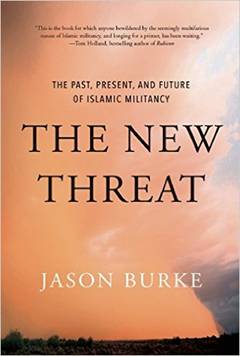 Abstract: Burke (The 9/11 Wars) draws on two decades of reporting on conflicts throughout the Middle East and South Asia for the Guardian and the Observer to deliver a comprehensive, lucid study of Islamic militancy. Wide-ranging and thought-provoking, Burke’s work identifies various factors in the rise of modern-day Muslim extremist groups: a renewed sense of religious identity in the 1970s, oil-rich Saudi Arabia’s promotion of conservative Wahhabism, nostalgia for bygone Islamic empires, the Soviet invasion of Afghanistan, the U.S. invasion of Iraq, and, most recently, disillusionment with the Arab Spring. He covers the two main global organizations, al-Qaeda and ISIS, and their bitter rivalry, as well as the affiliates (Boko Haram, al-Qaeda in the Arabian Peninsula, al-Shabaab). Assessing the current threat, Burke finds that al-Qaeda’s ability to launch spectacular attacks is much diminished. Abstract: Burke (The 9/11 Wars) draws on two decades of reporting on conflicts throughout the Middle East and South Asia for the Guardian and the Observer to deliver a comprehensive, lucid study of Islamic militancy. Wide-ranging and thought-provoking, Burke’s work identifies various factors in the rise of modern-day Muslim extremist groups: a renewed sense of religious identity in the 1970s, oil-rich Saudi Arabia’s promotion of conservative Wahhabism, nostalgia for bygone Islamic empires, the Soviet invasion of Afghanistan, the U.S. invasion of Iraq, and, most recently, disillusionment with the Arab Spring. He covers the two main global organizations, al-Qaeda and ISIS, and their bitter rivalry, as well as the affiliates (Boko Haram, al-Qaeda in the Arabian Peninsula, al-Shabaab). Assessing the current threat, Burke finds that al-Qaeda’s ability to launch spectacular attacks is much diminished. |
| 14. Nigeria: a new history of a turbulent century / Richard Bourne - London: Zed Books, 2015 |
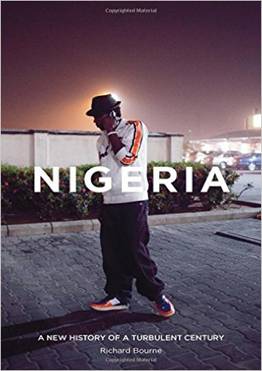 Abstract: Known as the 'African Giant', Nigeria's story is a complex and often contradictory one. How, despite the ravages of colonialism, civil war, ongoing economic disappointment and most recently the Boko Harem armed insurgency, has the country managed to stay together for a hundred years? Why, despite an abundance of oil, mineral and agricultural wealth, have so many of its people remained in poverty? These are the key questions explored by Richard Bourne in this remarkable and wide-ranging account of Nigeria's history since it came into existence as a defined geographical entity in 1914. Featuring a wealth of original research and interviews, this is an essential insight into the shaping of a country where - despite the seemingly dashed hopes that were raised at independence - there still remains hope 'the Nigeria project' may still succeed. Abstract: Known as the 'African Giant', Nigeria's story is a complex and often contradictory one. How, despite the ravages of colonialism, civil war, ongoing economic disappointment and most recently the Boko Harem armed insurgency, has the country managed to stay together for a hundred years? Why, despite an abundance of oil, mineral and agricultural wealth, have so many of its people remained in poverty? These are the key questions explored by Richard Bourne in this remarkable and wide-ranging account of Nigeria's history since it came into existence as a defined geographical entity in 1914. Featuring a wealth of original research and interviews, this is an essential insight into the shaping of a country where - despite the seemingly dashed hopes that were raised at independence - there still remains hope 'the Nigeria project' may still succeed. |
| 15. Old Europe new Asia: strategies, challenges, responses / Krishnan Srinivasan - New Delhi: Pentagon Press, 2016. |
 Abstract: The book traces the various contemporary interactions between Europe, essentially the European Union, and the emerging big economies of Asia, primarily China and India. Covering strategic partnerships, the environment, and human rights, international organizations, trade and investment, the author considers that Europe and emerging Asia could be natural partners with considerable synergy in fashioning a new multi-polar world, but are handicapped by their respective internal weaknesses, lack of self-confidence, and the considerable influence of the United States despite the probability of its rebalance to Asia proving to be a non-starter. This book explores the limitations of thepresent in Europe-Asian relations, and the potential for the future. Abstract: The book traces the various contemporary interactions between Europe, essentially the European Union, and the emerging big economies of Asia, primarily China and India. Covering strategic partnerships, the environment, and human rights, international organizations, trade and investment, the author considers that Europe and emerging Asia could be natural partners with considerable synergy in fashioning a new multi-polar world, but are handicapped by their respective internal weaknesses, lack of self-confidence, and the considerable influence of the United States despite the probability of its rebalance to Asia proving to be a non-starter. This book explores the limitations of thepresent in Europe-Asian relations, and the potential for the future. |
| 16. Pentagon's brain: an uncensored history of DARPA, America's top secret military research agency / Annie Jacobsen - New York: Little, Brown and Company, 2015 |
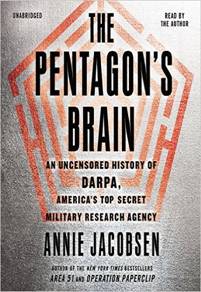 Abstract: No one has ever written the history of the Defense Department's most secret, most powerful, and most military science R&D agency. In the first-ever history about the organization, New York Times bestselling author Annie Jacobsen draws on inside sources, exclusive interviews, private documents, and declassified memos to paint a picture of DARPA, or "the Pentagon's brain," from its Cold War inception in 1958 to the present. Abstract: No one has ever written the history of the Defense Department's most secret, most powerful, and most military science R&D agency. In the first-ever history about the organization, New York Times bestselling author Annie Jacobsen draws on inside sources, exclusive interviews, private documents, and declassified memos to paint a picture of DARPA, or "the Pentagon's brain," from its Cold War inception in 1958 to the present. |
| 17. Perspectives on Turkey's multi-regional role in the 21st century / Edited by Mujib Alam - New Delhi: KW Publishers, 2015 |
 Abstract: This book dwells upon the various aspects of the Turkish foreign policy in the different regions of the world, especially with the dawn of the twenty-first century. Turkey has attracted international attention due to a marked transformation in the country's domestic and external realms, which in turn, has led to an increased activism in its foreign policy actions. Particularly, Turkey's economic rise has fuelled the country's ambition and quest for a more significant role in international affairs. These transformations have come about with the ascendance of the Adalet ve Kalkinma Partisi (AKP) [or Justice & Development Party (JDP)] to power in 2002. Abstract: This book dwells upon the various aspects of the Turkish foreign policy in the different regions of the world, especially with the dawn of the twenty-first century. Turkey has attracted international attention due to a marked transformation in the country's domestic and external realms, which in turn, has led to an increased activism in its foreign policy actions. Particularly, Turkey's economic rise has fuelled the country's ambition and quest for a more significant role in international affairs. These transformations have come about with the ascendance of the Adalet ve Kalkinma Partisi (AKP) [or Justice & Development Party (JDP)] to power in 2002. |
| 18. The Political future of Afghanistan: issues and perspectives / Edited by Arpita Basu Roy and Srimanti Sarkar – New Delhi: KW Publishers, 2016 |
 Abstract: Is Afghanistan's political future at an impasse? There are both internal and external reasons supporting a in the affirmative. Although considerable gains were made in the country following the 2001 international intervention, increasing insurgent attacks threaten the fledging post-Taliban government while strategies of regional and sometimes extra-regional states threaten to destabilize and weaken it from the outside. Efforts to guarantee stability continue to be undermined by the implications of a political settlement with the Taliban and other armed opposition groups. Abstract: Is Afghanistan's political future at an impasse? There are both internal and external reasons supporting a in the affirmative. Although considerable gains were made in the country following the 2001 international intervention, increasing insurgent attacks threaten the fledging post-Taliban government while strategies of regional and sometimes extra-regional states threaten to destabilize and weaken it from the outside. Efforts to guarantee stability continue to be undermined by the implications of a political settlement with the Taliban and other armed opposition groups. |
| 19. Politics of the united nations peacekeeping operations: resource mobilisation and alternative arrangements / Yeshi Choedon - New Delhi : KW Publishers , 2015 |
 Abstract: Peacekeeping is the most visible mechanism of the United Nations for managing conflicts in the world. Since the end of the Cold War, it has been confronted with acute resource constraints in carrying out its ambitious mandates. It is not so much the lack of resource availability, but the politics of resource mobilisation that has prevented the effective utilisation of the peacekeeping mechanism. Interested member states have been quick in pointing out the ineffectiveness and incompetence of the UN’s peacekeeping operations and in advocating alternative arrangements such as ‘coalition of states’, individual states’ and regional organisations’ operations. Even in the case of financing, they do not favour any increase in the already assessed contribution of the member states—favouring instead other alternative arrangements such as Trust Funds, subcontracts to other actors and ‘living-off-the-land’ arrangements. This book examines in depth the politics of the mobilisation of military personnel and finance, as both these resources are not only the most essential requirements but are also the most quantifiable—which enables an analysis of how they have increased and been contributed to by the member states over time—and how alternative arrangements appear to have overcome constraints in these resources. It highlights the fact that despite these alternative arrangements, the United Nations continues to be the most legitimate body for the conduct of peacekeeping operations. Even when the alternative arrangements have been used, the UN operations have invariably been deployed before them, in sequence with or in parallel to them. So, the UN peacekeeping operations have neither been replaced nor have they become redundant. Abstract: Peacekeeping is the most visible mechanism of the United Nations for managing conflicts in the world. Since the end of the Cold War, it has been confronted with acute resource constraints in carrying out its ambitious mandates. It is not so much the lack of resource availability, but the politics of resource mobilisation that has prevented the effective utilisation of the peacekeeping mechanism. Interested member states have been quick in pointing out the ineffectiveness and incompetence of the UN’s peacekeeping operations and in advocating alternative arrangements such as ‘coalition of states’, individual states’ and regional organisations’ operations. Even in the case of financing, they do not favour any increase in the already assessed contribution of the member states—favouring instead other alternative arrangements such as Trust Funds, subcontracts to other actors and ‘living-off-the-land’ arrangements. This book examines in depth the politics of the mobilisation of military personnel and finance, as both these resources are not only the most essential requirements but are also the most quantifiable—which enables an analysis of how they have increased and been contributed to by the member states over time—and how alternative arrangements appear to have overcome constraints in these resources. It highlights the fact that despite these alternative arrangements, the United Nations continues to be the most legitimate body for the conduct of peacekeeping operations. Even when the alternative arrangements have been used, the UN operations have invariably been deployed before them, in sequence with or in parallel to them. So, the UN peacekeeping operations have neither been replaced nor have they become redundant. |
| 20. Reagan's legacy in a world transformed / Edited by Jeffrey L. Chidester and Paul Kengor - London: Harvard University Press, 2015 |
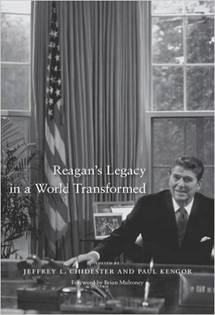 Abstract: Since Ronald Reagan left office in 1989, the global community has witnessed the collapse of the Soviet Union integration of Europe, the War on Terror and the Arab Spring, a hot Chinese economy and a major international recession. Reagan s Legacy in a World Transformed "brings together scholars from diverse disciplines and persuasions to assess the fortieth president s policies and their ongoing impact today, and to offer a timely retrospective on his complex legacy. The authors consider the influence of Reagan s free-market ideas on economic globalization, showing how deregulation succeeded in spurring economic expansion. In foreign policy, Reagan favored significant increases in military spending ( peace through strength ) and an assertive agenda abroad. Abstract: Since Ronald Reagan left office in 1989, the global community has witnessed the collapse of the Soviet Union integration of Europe, the War on Terror and the Arab Spring, a hot Chinese economy and a major international recession. Reagan s Legacy in a World Transformed "brings together scholars from diverse disciplines and persuasions to assess the fortieth president s policies and their ongoing impact today, and to offer a timely retrospective on his complex legacy. The authors consider the influence of Reagan s free-market ideas on economic globalization, showing how deregulation succeeded in spurring economic expansion. In foreign policy, Reagan favored significant increases in military spending ( peace through strength ) and an assertive agenda abroad. |
| 21. Realizing the demographic dividend: policies to achieve inclusive growth in India / Santosh Mehrotra - Cambridge: Cambridge University Press, 2016 |
 Abstract: This book discusses policies to achieve inclusive growth in India and realise the demographic dividend, which will end by 2040 when India will become an aging society. India is the world's fastest growing large economy, but jobs are not growing equally rapidly. The size of India's youth workforce is worrying, and the largely informal workforce is not covered by social insurance. Universal elementary education, despite the Right to Education Act 2009, is yet to be achieved. Health outcomes have improved only slowly over the years. Furthermore, sanitation still remains a very serious problem. Abstract: This book discusses policies to achieve inclusive growth in India and realise the demographic dividend, which will end by 2040 when India will become an aging society. India is the world's fastest growing large economy, but jobs are not growing equally rapidly. The size of India's youth workforce is worrying, and the largely informal workforce is not covered by social insurance. Universal elementary education, despite the Right to Education Act 2009, is yet to be achieved. Health outcomes have improved only slowly over the years. Furthermore, sanitation still remains a very serious problem. |
| 22. Rebooting India: realizing a billion aspirations / Nandan Nilekani and Viral Shah - Gurgoan: Allen Lane, 2015 |
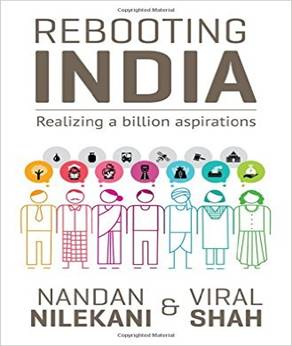 Abstract: India is sitting on a demographic dividend, expected to become the world’s youngest country by 2020 with 64 per cent of its population, roughly 800 million people, of working age. But our country cannot become a global powerhouse unless we resolve the contradictions and bridge the gaps that distort our society. The challenge before us is to enable every one of India’s 1.2 billion citizens to realize their aspirations. Abstract: India is sitting on a demographic dividend, expected to become the world’s youngest country by 2020 with 64 per cent of its population, roughly 800 million people, of working age. But our country cannot become a global powerhouse unless we resolve the contradictions and bridge the gaps that distort our society. The challenge before us is to enable every one of India’s 1.2 billion citizens to realize their aspirations. |
| 23. Rise of china and India: implications for the Asia pacific / Edited by Amitabh Mattoo and Mallika Joseph – New Delhi: Manohar, 2014 |
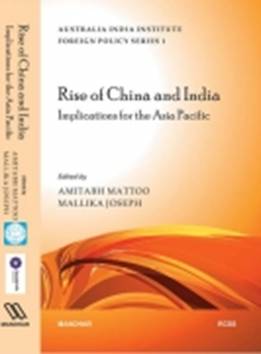 Abstract: The rapid economic growth of China and India carries significant political implications for the Asia-Pacific region and the international order, as these countries could alter the current balance of power. In the case of China, its rise is perceived as a threat by the current world super power, the United States, primarily due to China's ideological differences with liberal democratic regimes. The rise of India also causes similar concerns, primarily to the countries in South Asia. However, as a democracy with relatively stable institutions, India is perceived to be less threatening by most countries. With expanding economic interests and rising demands for greater resources to support their domestic populations, China and India will be developing close associations with all the countries in the Asia-Pacific. Abstract: The rapid economic growth of China and India carries significant political implications for the Asia-Pacific region and the international order, as these countries could alter the current balance of power. In the case of China, its rise is perceived as a threat by the current world super power, the United States, primarily due to China's ideological differences with liberal democratic regimes. The rise of India also causes similar concerns, primarily to the countries in South Asia. However, as a democracy with relatively stable institutions, India is perceived to be less threatening by most countries. With expanding economic interests and rising demands for greater resources to support their domestic populations, China and India will be developing close associations with all the countries in the Asia-Pacific. |
| 24. The Rise of Indian military power: evolution of an Indian strategic culture / G D. Bakshi -- 2nd ed. - New Delhi: KW Publishers, 2015 |
 Abstract: This book is possibly the first scientific analysis of Indian military history that has sought to study it in terms of a series of RMAs (revolutions in military affairs) that had profound implications in the socio-political sphere. Adopting this systems approach to the study of history enables us to isolate the key techno-economic triggers that brought about significant political phase transitions. Radical changes in the way war is waged have necessitated major economic changes. As the tools to wage war became more expensive, these could only be afforded by the larger states with a significant economic surplus. Questions have often been asked about whether India has a strategic culture at all? Is there an Indian way of war-fighting? This book seeks to answer these seminal questions. Abstract: This book is possibly the first scientific analysis of Indian military history that has sought to study it in terms of a series of RMAs (revolutions in military affairs) that had profound implications in the socio-political sphere. Adopting this systems approach to the study of history enables us to isolate the key techno-economic triggers that brought about significant political phase transitions. Radical changes in the way war is waged have necessitated major economic changes. As the tools to wage war became more expensive, these could only be afforded by the larger states with a significant economic surplus. Questions have often been asked about whether India has a strategic culture at all? Is there an Indian way of war-fighting? This book seeks to answer these seminal questions. |
| 25. The Routledge atlas of South Asian Affairs / Robert W. Bradnock - London: Routledge, 2016 |
 Abstract: South Asia has developed from a group of newly independent post-Colonial states of at most secondary importance to the wider world to its current position as a region of central strategic importance to both global economic development and world peace and stability. This Atlas highlights the global significance of South Asia in relation to economic, geopolitical and strategic interests. It provides a coherent descriptive and analytical account of the key elements of the complex societies that make up the region and its component countries. Illustrated with more than 100 original maps and offering concise entries on key issues, the book is structured thematically in these sections: Abstract: South Asia has developed from a group of newly independent post-Colonial states of at most secondary importance to the wider world to its current position as a region of central strategic importance to both global economic development and world peace and stability. This Atlas highlights the global significance of South Asia in relation to economic, geopolitical and strategic interests. It provides a coherent descriptive and analytical account of the key elements of the complex societies that make up the region and its component countries. Illustrated with more than 100 original maps and offering concise entries on key issues, the book is structured thematically in these sections: |
| 26. Routledge handbook of environment and society in Asia / Edited by Paul G. Harris and Graeme Lang - London: Routledge, 2015 |
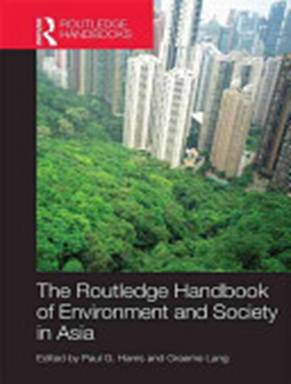 Abstract: This handbook provides a comprehensive survey of the cultural, social and policy contexts of environmental change across East Asia. The team of international experts critically examine a wide range of environmental problems related to energy, climate change, air, land, water, fisheries, forests and wildlife. The editors conclude that, with nearly half of the human population of the planet, and several rapidly growing economies, most notably China, Asian societies will determine much of the future of human impacts on the regional and global environments. As climate change-related threats to society increase, the book strongly argues for increased environmental consciousness and action in Asian societies. Abstract: This handbook provides a comprehensive survey of the cultural, social and policy contexts of environmental change across East Asia. The team of international experts critically examine a wide range of environmental problems related to energy, climate change, air, land, water, fisheries, forests and wildlife. The editors conclude that, with nearly half of the human population of the planet, and several rapidly growing economies, most notably China, Asian societies will determine much of the future of human impacts on the regional and global environments. As climate change-related threats to society increase, the book strongly argues for increased environmental consciousness and action in Asian societies. |
| 27. The Silk Road: Central Asia, Afghanistan and Iran: a travel companion / Jonathan Tucker - London: I.B. Tauris, 2015 |
 Abstract: Stretching from the ancient Chinese capital of Xian across the expanses of Central Asia to Rome, the Silk Road was, for 2,000 years, a vibrant network of arteries that carried the lifeblood of nations across the world. Along a multitude of routes everything was exchanged: exotic goods, art, knowledge, religion, philosophy, disease and war. From its earliest beginnings in the days of Alexander the Great and the Han Dynasty, the Silk Road expanded and evolved, reaching its peak under the Tang and Byzantine empires and gradually crumbling with the decline of the Mongol empire. In this beautifully illustrated book, which covers the Central Asian section of the Silk Road–from Lake Issy Kul through Tashkent, Samarkand. Abstract: Stretching from the ancient Chinese capital of Xian across the expanses of Central Asia to Rome, the Silk Road was, for 2,000 years, a vibrant network of arteries that carried the lifeblood of nations across the world. Along a multitude of routes everything was exchanged: exotic goods, art, knowledge, religion, philosophy, disease and war. From its earliest beginnings in the days of Alexander the Great and the Han Dynasty, the Silk Road expanded and evolved, reaching its peak under the Tang and Byzantine empires and gradually crumbling with the decline of the Mongol empire. In this beautifully illustrated book, which covers the Central Asian section of the Silk Road–from Lake Issy Kul through Tashkent, Samarkand. |
| 28. Singapore in a post-Kyoto world: energy, environment and the economy / Tilak K. Doshi - Singapore: Institute of Southeast Asian Studies, 2015 |
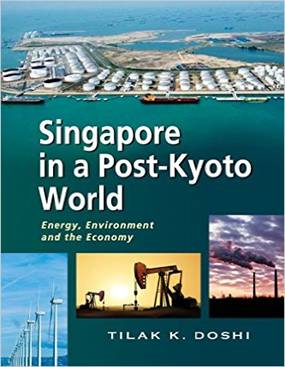 Abstract: Singapore had, by the 1980s, emerged as one of the world's great oil refining and trading centers, with the "East of Suez" region within its sphere of influence. The city-state's policy-making went against the grain in much of its practice of economic development. It ensured that energy products were bought and sold in the domestic market at essentially global prices, in contrast to the common practice in developing countries of subsidizing energy fuels for social equity. Without a drop of oil of its own, Singapore also managed to attract large foreign investments in the capital-intensive oil refining and petrochemical manufacturing sectors in an export-oriented strategy. Abstract: Singapore had, by the 1980s, emerged as one of the world's great oil refining and trading centers, with the "East of Suez" region within its sphere of influence. The city-state's policy-making went against the grain in much of its practice of economic development. It ensured that energy products were bought and sold in the domestic market at essentially global prices, in contrast to the common practice in developing countries of subsidizing energy fuels for social equity. Without a drop of oil of its own, Singapore also managed to attract large foreign investments in the capital-intensive oil refining and petrochemical manufacturing sectors in an export-oriented strategy. |
| 29. The Sunni tragedy in the Middle East: northern Lebanon from Al-Qaeda to ISIS / Bernard Rougier - New Jersey: Princeton University Press, 2015 |
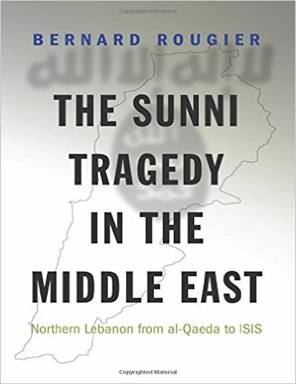 Abstract: This riveting book is based on more than a decade of research, more than one hundred in-depth interviews with players at all levels, and Rougier's extraordinary access to original source material. Written by one of the world's leading experts on jihadism, The Sunni Tragedy in the Middle East provides timely insight into the social, political, and religious life of this dangerous and strategically critical region of the Middle East. Abstract: This riveting book is based on more than a decade of research, more than one hundred in-depth interviews with players at all levels, and Rougier's extraordinary access to original source material. Written by one of the world's leading experts on jihadism, The Sunni Tragedy in the Middle East provides timely insight into the social, political, and religious life of this dangerous and strategically critical region of the Middle East. |
| 30. The Syrian Jihad: Al-Qaeda, the Islamic state and the evolution of an insurgency / Charles R. Lister - London: Hurst & Company, 2015 |
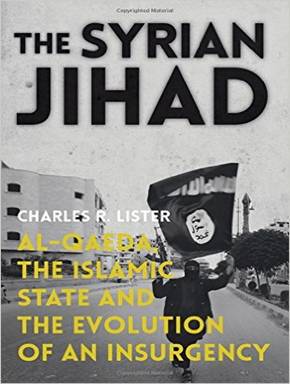 Abstract: This book assesses and explains the emergence since 2011 of Sunni jihadist organizations in Syria's fledgling insurgency charts their evolution and situates them within the global Islamist project. Unprecedented numbers of foreign fighters have joined such groups, who will almost certainly continue to host them. Thus, external factors in their emergence are scrutinized, including the strategic and tactical lessons learned from other jihadist conflict zones and the complex interplay between Al-Qaeda and the Islamic State and how it has influenced the jihadist sphere in Syria. Abstract: This book assesses and explains the emergence since 2011 of Sunni jihadist organizations in Syria's fledgling insurgency charts their evolution and situates them within the global Islamist project. Unprecedented numbers of foreign fighters have joined such groups, who will almost certainly continue to host them. Thus, external factors in their emergence are scrutinized, including the strategic and tactical lessons learned from other jihadist conflict zones and the complex interplay between Al-Qaeda and the Islamic State and how it has influenced the jihadist sphere in Syria. |
| 31. Terrorism and homeland security / Timothy A. Capron, Stephanie B. Mizrahi - London: Sage, 2016 |
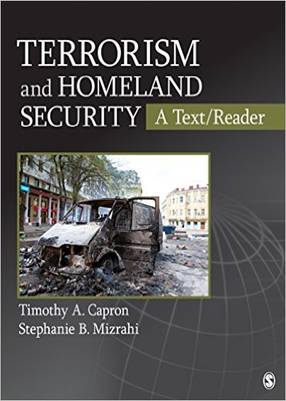 Abstract: This title takes a regional approach to combining information found in a traditional text with a variety of published articles on terrorism and homeland security. Authors Timothy A Capron and Stephanie B. Mizrahi provide students with a broad overview of the material followed by a deeper exploration of each issue through carefully selected journal articles. Students will be exposed to original research and literature in this area, and encouraged to think critically and analytically about the state of studies in terrorism and homeland security. Abstract: This title takes a regional approach to combining information found in a traditional text with a variety of published articles on terrorism and homeland security. Authors Timothy A Capron and Stephanie B. Mizrahi provide students with a broad overview of the material followed by a deeper exploration of each issue through carefully selected journal articles. Students will be exposed to original research and literature in this area, and encouraged to think critically and analytically about the state of studies in terrorism and homeland security. |
| 32. The Trans Himalayan Tibet: history, language and literature (traditional & contemporary): A copter approach / Edited by Tsetan Namgyal - New Delhi: Manakin Press, 2016 |
 Abstract: The Copter focal point on the Trans-Himalayan peoples with multi-ethnicity requires reassessment. The 'Dan tig dkar chag' with requisite maps narrates their fading image. Impact of Stag jig Bon po priests that of South Asian Buddhists followed by Muslims with Persian influence make them distinct from other Asians. Their self assessment with rationale generates series of logical analyses. Their Languages distinguish them too in traits of communication. It opens an unprecedented vista as Elite Circle would remark. Dr. Annie Bien points out it through poetic way like as 'Threading the World Garland as a Rosary (Snyan nag)' while one speak of Ethnic Tibetans in and out of the Land of Snow. Professor László Pap a Hungarian Buddhist scholar and scientist by profession who explored well about what Csoma de koros the father of Tibetologist, mesmeric contribution to Tibetan literary works nicely innovated with his through observation on the Tibetan language and its transmission of Buddhist scripture to the Europeans and the English knowing Indian. Abstract: The Copter focal point on the Trans-Himalayan peoples with multi-ethnicity requires reassessment. The 'Dan tig dkar chag' with requisite maps narrates their fading image. Impact of Stag jig Bon po priests that of South Asian Buddhists followed by Muslims with Persian influence make them distinct from other Asians. Their self assessment with rationale generates series of logical analyses. Their Languages distinguish them too in traits of communication. It opens an unprecedented vista as Elite Circle would remark. Dr. Annie Bien points out it through poetic way like as 'Threading the World Garland as a Rosary (Snyan nag)' while one speak of Ethnic Tibetans in and out of the Land of Snow. Professor László Pap a Hungarian Buddhist scholar and scientist by profession who explored well about what Csoma de koros the father of Tibetologist, mesmeric contribution to Tibetan literary works nicely innovated with his through observation on the Tibetan language and its transmission of Buddhist scripture to the Europeans and the English knowing Indian. |
| 33. Transboundary water management and the climate change debate / Anton Earle - London: Routledge, 2015 |
 Abstract: The book charts approaches which have been taken over the past two decades to promote more effective water management institutions, covering issues of conflict, cooperation, power and law. A new framework for a better understanding of the interaction between transboundary water management institutional resilience and global change is developed through analysis of the way these institutions respond to the climate change debate. This framework is applied to six river case studies from Africa, Asia and the Middle East (Ganges-Brahmaputra, Jordan, Mekong, Niger, Nile, Orange-Senqu) from which learning conclusions and policy recommendations are developed. Abstract: The book charts approaches which have been taken over the past two decades to promote more effective water management institutions, covering issues of conflict, cooperation, power and law. A new framework for a better understanding of the interaction between transboundary water management institutional resilience and global change is developed through analysis of the way these institutions respond to the climate change debate. This framework is applied to six river case studies from Africa, Asia and the Middle East (Ganges-Brahmaputra, Jordan, Mekong, Niger, Nile, Orange-Senqu) from which learning conclusions and policy recommendations are developed. |
| 34. The U.S. intelligence community / Jeffrey T. Richelson - Boulder: Westview Press, 2016 |
 Abstract: The role of intelligence in US government operations has changed dramatically and is now more critical than ever to domestic security and foreign policy. This authoritative and highly researched book written by Jeffrey T. Richelson provides a detailed overview of America's vast intelligence empire, from its organizations and operations to its management structure. Drawing from a multitude of sources, including hundreds of official documents, The US Intelligence Community allows students to understand the full scope of intelligence organizations and activities, and gives valuable support to policymakers and military operations. Abstract: The role of intelligence in US government operations has changed dramatically and is now more critical than ever to domestic security and foreign policy. This authoritative and highly researched book written by Jeffrey T. Richelson provides a detailed overview of America's vast intelligence empire, from its organizations and operations to its management structure. Drawing from a multitude of sources, including hundreds of official documents, The US Intelligence Community allows students to understand the full scope of intelligence organizations and activities, and gives valuable support to policymakers and military operations. |
| 35. UN Convention on the law of the sea and the South China sea / Edited by Shicun Wu - England: Ashagte, 2015 |
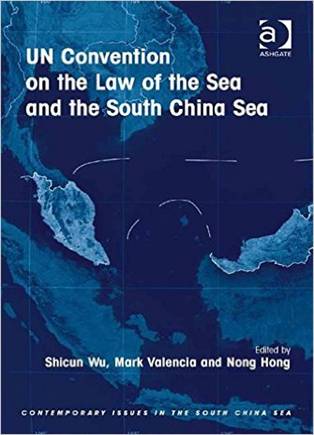 Abstract: Research on The United Nations Convention on the Law of the Sea (UNCLOS) is a valuable addition to understanding the political situation in the potentially volatile South China Sea region. This book covers topics such as baselines, historic title and rights, due regard and abuse of rights, peaceful use of the ocean, navigation regimes, marine scientific research, intelligence gathering, the UNCLOS dispute settlement system and regional common heritage. In search of varying viewpoints, the authors in this book come from multiple countries, including the Philippines, Australia, Ireland, Mainland China and Taiwan, the United States, and Indonesia, Singapore, UK and Germany. Ongoing events, such as the recent waves made by China in the East China Sea and increasing tensions between the South East Asian countries over the use of South China Sea, make this book especially pertinent. Abstract: Research on The United Nations Convention on the Law of the Sea (UNCLOS) is a valuable addition to understanding the political situation in the potentially volatile South China Sea region. This book covers topics such as baselines, historic title and rights, due regard and abuse of rights, peaceful use of the ocean, navigation regimes, marine scientific research, intelligence gathering, the UNCLOS dispute settlement system and regional common heritage. In search of varying viewpoints, the authors in this book come from multiple countries, including the Philippines, Australia, Ireland, Mainland China and Taiwan, the United States, and Indonesia, Singapore, UK and Germany. Ongoing events, such as the recent waves made by China in the East China Sea and increasing tensions between the South East Asian countries over the use of South China Sea, make this book especially pertinent. |
| 36. The UN Security Council: in the 21st century / Edited by Sebastian Von Einsiedel - London: Lynne Rienner, 2016 |
 Abstract: After grappling for two decades with the realities of the post–Cold War era, the UN Security Council must now meet the challenges of a resurgence of great power rivalry. Reflecting this new environment, The UN Security Council in the 21st Century provides a comprehensive view of the council's internal dynamics, its role and relevance in world politics, and its performance in addressing today's major security challenges. Abstract: After grappling for two decades with the realities of the post–Cold War era, the UN Security Council must now meet the challenges of a resurgence of great power rivalry. Reflecting this new environment, The UN Security Council in the 21st Century provides a comprehensive view of the council's internal dynamics, its role and relevance in world politics, and its performance in addressing today's major security challenges. |
| 37. Under the black flag: at the frontier of the new jihad / Sami, Moubayed - London: I.B. Tauris, 2015 |
 Abstract: The Islamic State movement (ISIS/IS) burst onto the world stage in 2014. From its heartland in Syria, where it arose from the chaos of the Syrian Revolt, the organization has expanded in ideology and membership and now poses a significant threat to the region, if not to the wider world. Moubayed, a Beirut-based journalist who has been analyzing Syria and the region for 20 years, has unrivalled access to the movement and its participants. His book is the first inside account of an organization which has dominated the headlines with a dangerous mix of barbarity and military prowess. In looking at the historical background of ISIS: where it came from, how it evolved, where it stands today and what its aims are for the future to reveal, it will provide, for the first time, a fully-fledged picture of what lies at the heart of the Islamic State. Abstract: The Islamic State movement (ISIS/IS) burst onto the world stage in 2014. From its heartland in Syria, where it arose from the chaos of the Syrian Revolt, the organization has expanded in ideology and membership and now poses a significant threat to the region, if not to the wider world. Moubayed, a Beirut-based journalist who has been analyzing Syria and the region for 20 years, has unrivalled access to the movement and its participants. His book is the first inside account of an organization which has dominated the headlines with a dangerous mix of barbarity and military prowess. In looking at the historical background of ISIS: where it came from, how it evolved, where it stands today and what its aims are for the future to reveal, it will provide, for the first time, a fully-fledged picture of what lies at the heart of the Islamic State. |
| 38. War against the people: Israel, the Palestinians and global pacification / Jeff Halper - London: Pluto Press, 2015 |
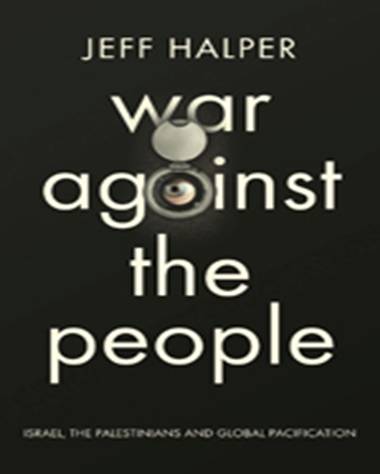 Abstract: War against the People is a powerful indictment of the Israeli state’s “securocratic” war in the Palestinian Occupied Territories. Author draws on firsthand research to show the pernicious effects of the subliminal form of unending warfare conducted by Israel, an approach that relies on sustaining fear among the populace, fear that is stoked by suggestions that the enemy is inside the city limits, leaving no place truly safe and justifying the intensification of military action and militarization in everyday life. Eventually, author shows, the integration of militarized systems—including databases tracking civilian activity, automated targeting systems, unmanned drones, and more—becomes seamless with everyday life and the occupied territories, author argues, is a veritable laboratory for that approach. Abstract: War against the People is a powerful indictment of the Israeli state’s “securocratic” war in the Palestinian Occupied Territories. Author draws on firsthand research to show the pernicious effects of the subliminal form of unending warfare conducted by Israel, an approach that relies on sustaining fear among the populace, fear that is stoked by suggestions that the enemy is inside the city limits, leaving no place truly safe and justifying the intensification of military action and militarization in everyday life. Eventually, author shows, the integration of militarized systems—including databases tracking civilian activity, automated targeting systems, unmanned drones, and more—becomes seamless with everyday life and the occupied territories, author argues, is a veritable laboratory for that approach. |
| 39. A war nobody won: the Sino-Vietnam war 1979 / Harjeet Singh - New Delhi: Pentagon Press, 2015 |
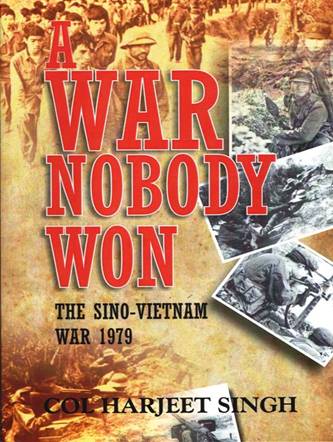 Abstract: The book also expounds Beijing`s approach to warfare, showing its distinctive Chinese characteristics. Its leadership did not hesitate to use force after calculating when and how to use military power. The aim of the PLA was to seize and maintain the operational initiative; and the basis on which the Chinese evaluated military success was geopolitical rather than operational execution. The PLA was roughly handled by the Vietnamese, but accomplished Beijing`s strategic goals, diverting Vietnam`s attention to the military offensive on its northern border which undercut its actions in South-East Asia. The role of the USA and Soviet Union is also probed in a war nobody won. Abstract: The book also expounds Beijing`s approach to warfare, showing its distinctive Chinese characteristics. Its leadership did not hesitate to use force after calculating when and how to use military power. The aim of the PLA was to seize and maintain the operational initiative; and the basis on which the Chinese evaluated military success was geopolitical rather than operational execution. The PLA was roughly handled by the Vietnamese, but accomplished Beijing`s strategic goals, diverting Vietnam`s attention to the military offensive on its northern border which undercut its actions in South-East Asia. The role of the USA and Soviet Union is also probed in a war nobody won. |
| 40. Why India is not a great power (Yet) / Bharat Karnad - New Delhi : Oxford University Press , 2015 |
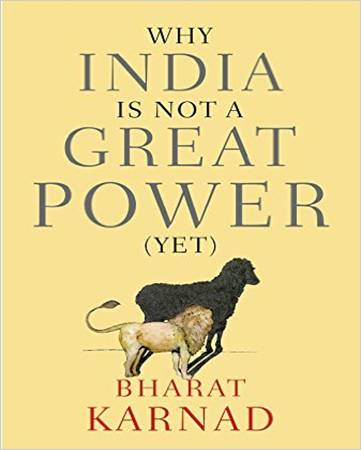 Abstract: In this book, Bharat Karnad delves exclusively into these hard power aspects of India’s rise and the problems associated with them. He offers an incisive analysis of the deficits in the country’s military capabilities and in the ‘software’ related to hard power—absence of political vision and will, insensitivity to strategic geography, and unimaginative foreign and military policies—and arrives at powerful arguments on why these shortfalls have prevented the country from achieving the great power status. Abstract: In this book, Bharat Karnad delves exclusively into these hard power aspects of India’s rise and the problems associated with them. He offers an incisive analysis of the deficits in the country’s military capabilities and in the ‘software’ related to hard power—absence of political vision and will, insensitivity to strategic geography, and unimaginative foreign and military policies—and arrives at powerful arguments on why these shortfalls have prevented the country from achieving the great power status. |
| 41. The Yudhoyono presidency: Indonesia's decade of stability and stagnation / Edited by Edward Aspinall Singapore: ISEAS, 2015 |
 Abstract: The presidency of Susilo Bambang Yudhoyono (2004-14) was a watershed in Indonesia's modern democratic history. Yudhoyono was not only the first Indonesian president to be directly elected, but also the first to be democratically re-elected. Coming to office after years of turbulent transition, he presided over a decade of remarkable political stability and steady economic growth. But other aspects of his rule have been the subject of controversy. While supporters view his presidency as a period of democratic consolidation and success, critics view it as a decade of stagnation and missed opportunities. Abstract: The presidency of Susilo Bambang Yudhoyono (2004-14) was a watershed in Indonesia's modern democratic history. Yudhoyono was not only the first Indonesian president to be directly elected, but also the first to be democratically re-elected. Coming to office after years of turbulent transition, he presided over a decade of remarkable political stability and steady economic growth. But other aspects of his rule have been the subject of controversy. While supporters view his presidency as a period of democratic consolidation and success, critics view it as a decade of stagnation and missed opportunities. |
|